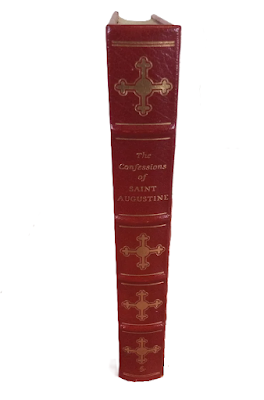Easton Press Saint Augustine books
The Confessions of Saint Augustine - 100 Greatest Books Ever Written - 1979St. Augustine of Hippo (biography) - Gerald Bonner - 1995
Franklin Library Saint Augustine books
The Confessions - Great Books of the Western World - 1980
The City of God and Christian Doctrine - Great Books of the Western World - 1985
Saint Augustine biography
Saint Augustine, (354-430), was the greatest of the Latin Fathers and one of the most eminent Doctors of the Western Church. Saint Augustine was born in Tagaste, Numidia (now Soukh Ahras, Algeria). His father, Patricius, was a pagan who later converted, but his mother was a devout Christian who laboured untiringly for her son's conversion and who was canonized by the Roman Catholic Church. Saint Augustine was educated as a rhetorician at Tagaste, Madaura, and Carthage. From around the age of sixteen he lived for many years with a concubine, by whom he had one natural son, whom he named Adeodatus.
Through reading Hortensius by the Roman writer Marcus Tullius Cicero, Saint Augustine became an earnest seeker of truth. He considered becoming a Christian, but experimented with several philosophical systems before finally joining the Christian faith. For nine years he adhered to Manichaeism, a Persian dualistic philosophy then widely practiced in the Western Roman Empire. With its fundamental principle of conflict between good and evil, Manichaeism seemed to Saint Augustine at first to correspond to the facts of the experience and to furnish the most plausible hypothesis upon which to build a philosophical and ethical system. Moreover, its demands upon novices were not strict enough to cause great uneasiness of conscience; hence Saint Augustine's petition, which he later recorded, "Lord, make me pure and chaste but not quite yet!" Disillusioned by the impossibility of reconciling certain contradictory Manichaeist doctrines, Saint Augustine abandoned Manichaeism and turned to skepticism.
Around 383 Saint Augustine left Carthage for Rome, but he soon went on to Milan as a teacher of rhetoric. There he fell under the influence of the philosophy of Neoplatonism, and there also he met the bishop of Milan, Ambrose, then the most distinguished ecclesiastic in Italy. Saint Augustine presently was attracted again to Christianity. At last one day, according to his own account, he seemed to hear a voice, like that of a child, repeating, "Take and Read". Unable to recall any game in which children were known to utter these words, he interpreted them as divine orders to open the Bible and read the first passage he happened to see. Accordingly, he opened the Bible and read "Not in rioting and drunkenness, not in chambering and impurities, not in contention and envy, but put ye on the Lord Jesus Christ, and make not provision for the flesh in its concupiscence" (Rom. 13:13-14). Saint Augustine immediately resolved to embrace Christianity. With his natural son he was baptized by Ambrose on Easter Eve in 387. His mother, who had rejoined him in Italy, was rejoiced at this answer to her prayers and hopes. She died soon after at Ostia.
Saint Augustine returned to Africa and was made Presbyter in 391. He became bishop of Hippo in 395, an office he held until his death. It was a period of political and theological unrest, for while the barbarians pressed in upon the empire, even sacking Rome itself, schism and heresy also threatened the Church. Saint Augustine threw himself wholeheartedly into the theological battle. Besides combating the Manichaean heresy, Saint Augustine engaged in two great theological conflicts. One was with the Donatists, a sect which held that the sacraments were invalid if administered by ecclesiastics who had denied Christ under persecution. In the course of the controversy he developed his ecclesiastic and sacramental theories. The other conflict was with the Pelagians, followers of a British monk who denied the doctrine of original sin. In the course of this conflict, which was long and bitter, Saint Augustine developed his theories of sin and grace, of divine sovereignty, and of predestination. Augustine's doctrines can be interpreted from two sides, the ecclesiastical and the theological. The Roman Catholic church has found special satisfaction in the former; Catholic and Protestant theology alike are based on the latter. The French and German Reformation leaders, John Calvin and Martin Luther, were both close students of Saint Augustine.
Saint Augustine taught that the true Church was characterized by four qualities, namely unity, holiness, catholicity, and apostolicity. Outside this Church there could be no salvation. Convinced of the indispensable necessity of church membership, Saint Augustine finally came to believe it right to coerce the intractable; it was the duty of the Christian state to compel them to come in. The force doctrine can be found clearly stated in his Ninety third Epistle (408), where he cites the Parable of the Wedding Feast in support of his position. Saint Augustine's doctrine stood between the extremes of Pelagianism and Manichaeism. Against Pelagian naturalism he held that death came into the world as the result of sin, and that man is saved by divine grace; against Manichaeism he vigorously defended free will.
The place of prominence held by Saint Augustine among the Fathers and Doctors of the Church is comparable to that of Saint Paul among the Apostles. As a writer Saint Augustine is prolific and persuasive and a brilliant stylist. His best known book is his autobiography, The Confessions of Saint Augustine, which was written in 397. In his great apologetic book, The City of God (426), Saint Augustine appears in the role of seer, unfolding the meaning of the past and the secrets of the future with abundant learning and imagination. Ten of the twenty two books by Saint Augustine are devoted to refuting the pagan belief that worship of the gods insures prosperity in life or the after life. The remaining twelve books by Saint Augustine trace the origin, progress, and destiny of the city of God and the city of this world and foresee the final triumph of the former, which is the Christian Church. In 428 Saint Augustine wrote the Retractions, in which he registers his final verdict upon his previous books, correcting whatever his maturer judgement held to be misleading or wrong. The other books by Saint Augustine include the Epistles, of which there are 270 in the Benedictine edition, various dated between 386 and 429; his treatise On Free Will, On Christian Doctrine, On Baptism: Against the Donatists, On the Trinity, and On Nature and Grace; and Homilies upon several books of the Bible.
St Augustine quotes
"Love is the beauty of the soul."
"Faith is to believe what you do not see; the reward of this faith is to see what you believe."
"Patience is the companion of wisdom."
"The world is a book, and those who do not travel read only one page."
"Complete abstinence is easier than perfect moderation."
"Pray as though everything depended on God. Work as though everything depended on you."
"Hope
has two beautiful daughters; their names are Anger and Courage. Anger
at the way things are, and Courage to see that they do not remain as
they are."
"The confession of evil works is the first beginning of good works."
"God has no need of your money, but the poor have. You give it to the poor, and God receives it."
"He who is filled with love is filled with God himself."



Comments
Post a Comment
Share your best book review and recommendation